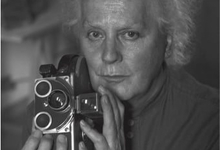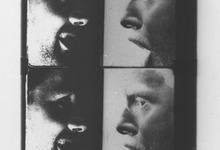- Images (6)
- Links (0)
- Agenda

|

|

|

|

|

|
Eulogy for Paolo Gioli
It was when speaking of death, a theme so present in his work, that Paolo Gioli had imagined his own epitaph; a bit of vanity through which he wanted to ward off the menace; this was in 2014.
I came to know the work of Paolo Gioli in 1974-75, when the first electronic image synthesizers began to appear, announcing a veritable revolution in image technology. Paradoxically, it was rumored that Paolo Gioli made the complex composite images of his films without any machines. The label of alchemist which one so easily attached to him implied that this solitary man had something of a magician or an esoteric about him, a Robinson Crusoe who would never leave his island.
At the end of the 19th century, Henry D. Thoreau wrote, "Men have become the tools of their tools." "We invented a whole range of amazing machines, and now they are reinventing us. Ironically, the more sophisticated they become, the more primitive we become ..."* When Marshall McLuhan defined the machine as a perfected extension of our senses, he added that the prosthesis-machine simultaneously impoverished our own natural capacities.
Paolo Gioli bursts in at the center of this anthropological knot. Surely, he wanted to remain as unscathed as possible, an homo naturalis who, surrounded by atrophied fellow men, was a demiurge capable of producing photography and cinema by hand. The man without a camera returned to the source of primitive intelligence, to the origins of the human need for invention in the face of nature: undoubtedly, some Rousseauist intentions were behind this will to unequip himself. Photography and cinema, before being media, were natural phenomena for Gioli, and he an artist-gatherer who, following a leaf, a shell, a butterfly, his own hands, was able to entrap them in order to create images as complex as they were simple, fragile, trembling like living beings, and always filled with an unspeakable emotion. Thank you, Paolo, for all that you have shown us!
*Warren Bennis, The Age of Unreality, 1989